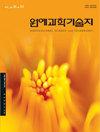Tug of War-Who is the Winner? Canker Disease Restructures the Endophytic Bacterial Community of Citrus
IF 0.8
4区 农林科学
Q3 HORTICULTURE
Korean Journal of Horticultural Science & Technology
Pub Date : 2023-10-31
DOI:10.7235/hort.20230052
引用次数: 0
Abstract
High-throughput sequencing and a 16S rRNA gene clone library amplicon analysis were used to study the endophytic microbial diversity in citrus leaves in response to a Xanthomonas citri pv. Citri (Xcc) infection in an effort to develop a biocontrol scheme for citrus canker disease. There are more species of moderate citrus canker disease (MCD) than severe citrus canker disease (SCD) in terms of both Shannon and Simpson index measurements. Taxonomy has shown that the MCD Firmicutes group (25.2%) outnumber the SCD group (0.55%). Some Firmicutes can suppress Xcc, but in SCD leaves, they are in a competitive position and do not have a dominating niche; therefore, their population is greatly decreased. Sphingomonas and Methylobacterium, two genera of the phylum Proteobacteria, are growth-promoting and stress-resistant in most plants and comprise approximately 60% of the SCD group, whereas the MCD group was less abundant. In conclusion, citrus canker disease restructures bacterial communities in infected leaves, causing the endophytic community to evolve toward “weakening its spear and strengthening its shield.” This research provides support for the idea that introducing helpful bacterial strains in advance may alter the relative abundance of bacteria in a given area and hence decrease the likelihood of infection by harmful bacteria. The future of sequencing technology lies in research on microbial community functions, the elucidation of plant processes and pathogen occurrence, and support for the development of plant biological control technologies.拔河比赛——谁是赢家?溃疡病重组柑橘内生细菌群落
采用高通量测序和16S rRNA基因克隆文库扩增子分析方法,研究了柑橘叶片内生微生物多样性对黄单胞菌(Xanthomonas citri pv)的响应。柑桔(Xcc)侵染,研究柑桔溃疡病生物防治方案。在香农指数和辛普森指数测量中,中度柑橘溃疡病(MCD)的种类多于重度柑橘溃疡病(SCD)。分类学显示MCD厚壁菌群(25.2%)多于SCD组(0.55%)。一些厚壁菌可以抑制Xcc,但在SCD叶片中,它们处于竞争地位,没有主导的生态位;因此,它们的数量大大减少。鞘单胞菌和甲基细菌是变形菌门的两个属,在大多数植物中具有促进生长和抗胁迫的作用,约占SCD组的60%,而MCD组的数量较少。总之,柑橘溃疡病重组了受感染叶片中的细菌群落,导致内生菌群落朝着“削弱其矛,加强其盾”的方向进化。这项研究支持了这样一种观点,即提前引入有益菌株可能会改变特定地区细菌的相对丰度,从而降低有害细菌感染的可能性。测序技术的未来在于研究微生物群落功能,阐明植物过程和病原体发生,支持植物生物防治技术的发展。
本文章由计算机程序翻译,如有差异,请以英文原文为准。
求助全文
约1分钟内获得全文
求助全文
来源期刊
CiteScore
2.00
自引率
0.00%
发文量
0
审稿时长
1 months
期刊介绍:
Horticultural Science and Technology (abbr. Hortic. Sci. Technol., herein ‘HST’; ISSN, 1226-8763), one of the two official journals of the Korean Society for Horticultural Science (KSHS), was launched in 1998 to provides scientific and professional publication on technology and sciences of horticultural area. As an international journal, HST is published in English and Korean, bimonthly on the last day of even number months, and indexed in ‘SCIE’, ‘SCOPUS’ and ‘CABI’. The HST is devoted for the publication of technical and academic papers and review articles on such arears as cultivation physiology, protected horticulture, postharvest technology, genetics and breeding, tissue culture and biotechnology, and other related to vegetables, fruit, ornamental, and herbal plants.

 求助内容:
求助内容: 应助结果提醒方式:
应助结果提醒方式:


